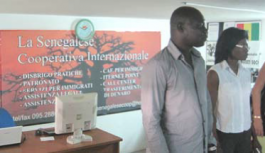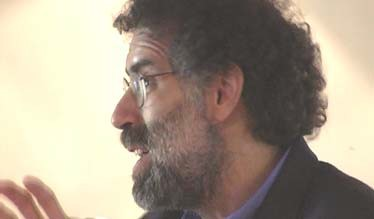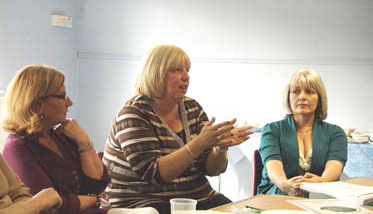Xploit and LABlearning approaches
Peter Kearns:
I would welcome your comments on the Xploit approach and the basic concepts of involvement and empowerment and some applications with disengaged youth, unemployed, migrants perhaps with some reference to the Scandinavian adult learning tradition. I would also be interested in the MIT Media Lab in Boston media learning concepts that you mention.
Xploit approach to involvement and empowerment

The European Xploit project, funded by the European Commission, is concerned with developing learning communities through the systematic exploitation of European lifelong learning resources. The focus of the project is the establishment of lifelong learning infrastructures in the communities built on the collaboration between policy-makers, educations and groups of active citizens.
Mobilizing and giving ownership to active citizens is key to the Xploit learning communities. In many European projects and initiatives migrants, low educated adults and drop- out youth are involved in the activities. They do not, however, own and drive the activities. Real empowerment is, in these communities, self-empowerment. It’s about the subject-object relationship: can we empower them? Or, should we establish frameworks for them to empower themselves? And it’s parallel to learning. You need to construct your own knowledge; you cannot simply transfer it from one person to another.
This is a great learning process for the citizens, disadvantaged citizens in particular, but it’s an even greater learning process for policy-makers and authorities: they must learn to play the role of frameworkers and facilitators and learn to allow the citizens time and space to self-empower. The standpoint of Xploit is that learning communities should build on such groups of active citizens and on a balance between policy-making and self-governing citizens. Furthermore, in Xploit we believe that learning cities should build on strong learning communities, a learning community being a part of a city, a suburb, a sector, en environment, etc.
Unfortunately self-empowerment does not fit well in the many of our pseudo- efficient communities, in which sustainable development is expected to take on the speed of the internet.
Papers attached:
Xploit Study Visit LeCiM Catania IT
EU Xploit Learning Cities visit to Israel
Link: www.xploit-eu.com
Approach to disengaged youth, unemployed and migrants

One of the biggest challenges in Europe now and in the future will be to re-motivate the new youth generations to engage in formal education. All European countries suffer increasingly from early school leaving, drop-out and poor educational experiences among young people. The new generations simply expose what we have known for decades: the old traditional education system is not working anymore. Perhaps it never really did, it just seemed that way.
The digital young people cannot learn in the old classrooms. Neither could I, by the way. Of course, this huge challenge starts to look scary if we look at, not only digital youth, but digital migrant and disadvantaged youth! Then hatred is mixed into the de-motivated young people...
The same goes for unemployed low educated adults and migrants. The old classrooms do not work for them either. Many projects are being carried out in Europe aiming to find new ways of learning for these millions of citizens. Few of them are successful, and if they are, they will normally never be mainstreamed into formal education.
In the European Xploit project, LABlearning project and many other initiatives, we are working to establish learning environments for these people that are quite different from the classrooms: we are searching for new didactics.
A number of didactic principles have emerged from such initiatives having been carried out over the last decade or so:
- The learners must work in laboratories of learning, not in classrooms
- The learners must use all kinds of state of the art technology to learn
- The learning process must be based on real projects, carried out in collaboration with community stakeholders
- The learning process must be build on the self-construction of knowledge, not on knowledge transfer
- The learning process must challenge the learners’ media skills, learning skills and talents
- The learning process should be collaborative and problem based
- The learning must link to the individual talents of the learners, no matter what kind of talents
- The learning must prove useful to the learners and to the community
- The learning process should result in actual products to deliver to a costumer, to younger learners, or to other players in the community
- Media based and game based learning should be included whenever possible We believe, at the same time, that learning communities should build on such principles.
Papers attached
LABlearning - Hand-out
LABlearning - Inspiration Hand-out
LABlearning principles
Media based learning
Parameters of innovative learning settings
The learning potentials of computer gaming Virtual gaming and learning skills
What does games in learning mean?
Scandinavian Game Developers EN hand-out
Links:
www.sosuaarhus-international.com/Gaming.htm
www.sosuaarhus-international.com/inspiration.htm
www.sosuMedia.dk
Scandinavian adult learning tradition
Most of our work with learning communities and lifelong learning is deeply inspired by two major sources:
- The Danish Grundtvig tradition
- The Computer Clubhouse Network and MIT Media Lab in Boston US

When we talk about adult education and adult learning in Europe today, we refer to the more than 100 year old Danish Grundtvig tradition. In the late 1890th people in rural areas in Denmark started to attend small learning circles in their communities. Without any purpose at all, expect the joy of learning and enriching your life, and the good feeling of knowing about the world.
Later on the trade unions joined this movement: the workers should be well- informed and cultivated people. Then, some 3 or 4 decades ago adult education was recognized as an important part of the non-formal and formal education system, and began to include further education, vocational training, etc.
Today adult education is an integrated part of universities, high schools, and all kinds of educational institutions and centres. There are several hundred adult education centres across Denmark and across Scandinavia. And, the European Commission has adopted Grundtvig!
Unfortunately today, in a situation where we need non-formal adult learning more than ever, the policy-makers are more interested in formal adult education and directly labour-market oriented adult training.
But let us recall what the old ideas were about:
- The learning should be voluntary and have no instrumental purpose
- The learning should be based on the adults’ internal drive, interest and curiosity
- The learning should be highly interactive and participatory
- The learning should be based on personal, family and community needs
- The learning might include all kinds of topics, also based on the interests and talents of the adults
- The learning included no admittance criteria and no tests
- The learning might lead to the adults taking a further interest in for instance formal education or art or community work
- The learning was for all citizens regardless of social and cultural background
It is, today, not difficult to see how useful such principles would be for learning communities and the learning motivation of low educated adults, migrants and disadvantaged families. It is also easy to see that learning communities should build on such activities.
Papers attached
European Centres for Adult Lifelong Learning
Link: www.sosuaarhus-international.com/UDINETrainers.htm
MIT Media Lab

In the 1950th creative people at the MIT Media Lab began to explore the potentials of communication technology for learning. People like Seymour Papert and Mitch Resnick have been key players. The experiments were and are based on an elaboration of Piaget’s learning principles: the MIT people added to Piaget’s constructivism that the learners would learn more if they not only constructed the learning themselves, but also constructed useful products throughout their learning process.
Then, in the 90th, the first Computer Clubhouses for disadvantaged youth were established in Boston. The idea was to offer young people between 12 and 18, spending most of their time in the streets, after-school facilities for working with advanced media technology and thus increase their learning motivation, self- confidence and educational and labour market opportunities.
The project was a great success and new Computer Clubhouses were established around the world. Now the Computer Clubhouse Network counts more than 100 clubhouses worldwide, from Boston to Palestine and India. We have been engaged in promoting the establishment of such clubhouses across Europe for more than 10 years. The Computer Clubhouse Network is now a partner in our new European youth project LABlearning, recently funded by the European Commission.
Some of the Computer Clubhouse principles are very important to our youth initiatives, in Denmark as well as in European projects:
- The young people attend the clubhouse activities out of their free will The clubhouses are open every afternoon, evening and weekend
- No traditional teaching should take place in the clubhouses, as they are based on collaborative media projects with mentors and community professionals
- The young people have access to explore all kinds of advanced media, from
- video production to animation and constructing (not playing!) computer games The young people work in teams and collaborate with companies and institutions in the community
- The young people can attend the clubhouses for many years, some of the old
- members become skilled mentors for new members
- The young people participate in the global online network
- All activities are based on the interests, talents and aspirations of the young people
- The clubhouses must be well-funded to allow the young people to work with advanced technology, but the media projects in the clubhouses should contribute to the clubhouse economy
Today, in European projects, we are working to implement the clubhouse principles in formal education, primary and secondary.
It is easy to see how such clubhouses and principles can be valuable to open learning centres in learning communities, and also foster intergenerational learning.
Papers attached:
Computer Clubhouse at a glance
Computer Clubhouse in a few words
Link: www.sosuaarhus-international.com/LABlearning.htm www.computerclubhouse.org
Peter Kearns:
I found your report on Swansea very interesting in your reference to citizenship in these communities in response to hard times, especially the role of women. This is a theme I would like to have developed in this area of the PIE exchanges and your contribution here would be very valuable. Has Xploit thrown up similar examples in the other Xploit communities?
The role of women in lifelong learning empowerment and learning communities

Will groups of housewives, low educated or migrant women play an important role in our learning communities?
In the European Xploit project we have experienced strong self-empowering groups of women taking action in their community: from the migrant women in Catania Italy and the working class women in Wales to the entrepreneurial groups of women in Berlin. It does seem like groups of women have certain talents, capacities and skills to establish social learning in their communities. With great patience and persistence they empower themselves for years and decades, and very soon they start addressing social needs in their communities, such as children’s and young people’s needs.
These groups of women are groups. They work together without trying to take individual leadership and ownership, they combine serious learning and social activities with bakery and coffee, and they collaborate easily with community stakeholders such as private enterprises and local authorities.
Individual and well educated women have been well off in most European countries for decades. But housewives from unemployed families? Migrant women with no or little education? Young mothers in difficult social conditions?
We should not try to dominate and control these resources into male theories, but simply try to describe what we see and how it works.
And we should learn.
Learn that we should pay much attention to groups of women in disadvantaged communities and learn to allow them the time and space to empower themselves. And learn to work with them, not take control.
Can policy-makers, local authorities and institutional managers do that?
Papers attached:
Xploit Study Visit LeCiM Catania IT Xploit Swansea Learning Experience
Link: Video interviews from Wales on www.xploit-eu.com [Available from the 1st of November 2011]
Brief background explanation:

Aarhus Social and Healthcare College in Denmark trains young people and adults for employment in the care sector. The College works with learners with little educational background and motivation. Half of the learners are young and adult migrants from more than 20 different countries.
Aarhus Social and Healthcare College is a pioneer College in Denmark and Europe, having been engaged in European learning cooperation for many years, developing and managing new European projects and coordinating European networks.
The key work areas are innovation in care education, learner mobility, learning inclusion of disadvantaged learners including migrants, exploration of media and game based learning and last, but not least: the establishment of learning communities across Europe.
A very important focus is developing new didactics for young people and adults to allow a renewed interest in learning.
The College established its own in house media department some 10 years ago, producing high quality multimedia to our care educations and to European projects, and collaborating with teachers and learners to explore the learning potentials of creative media.
Recently the College has engaged in exploring the learning potentials of learning games and social gaming.
The College employs 6 full time staff members in the international department and 3 full time media designers in the media department.
The College’s international website: www.sosuaarhus-international.com
The College media department, sosuMedia: www.sosuMedia.dk
The media based learning section (under construction): www.sosuaarhus-international.com/gaming.htm
| Attachment | Size |
|---|---|
| Xploit_and_LABlearning_approaches.pdf | 172.99 KB |
 Printer-friendly version
Printer-friendly version- Jan Gejel's blog
- Login to post comments
- 183 reads





Comments
Active citizens on learning communities - live from Swansea UK
Dear Colleagues.
In connection with the EU Xploit report from the learning communities in Swansea UK, a number of video interviews with active citizens from the Swansea communites are now available. Some of the citizens have been building community centres for lifelong learning for 25 years. Lots of useful experience!! Skilled people...

The direct links to the video interviews are:
http://xploit-eu.com/activities/video2.html
http://xploit-eu.com/resources/video3.html
http://xploit-eu.com/resources/video4.html
Best regards,
Jan Gejel
Denmark